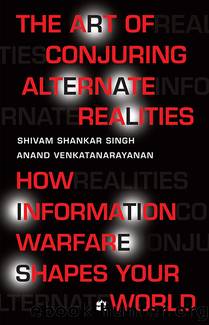The Art of Conjuring Alternate Realities by Shivam Shankar Singh

Author:Shivam Shankar Singh [Singh, Shivam Shankar]
Language: eng
Format: epub
Tags: null
Publisher: HarperCollins India
Published: 2021-02-15T00:00:00+00:00
8
DRINKING FROM YOUR SELF-CREATED CUP OF ALTERNATE REALITY
Most nation states in the world are not made up of homogeneous populations that consist of people who share the same reality. In fact, the perception of reality for various groups of people differs vastly from that of other groups due to several aspects. They may belong to a different religion, race, ethnicity or belief system, giving them a different lived reality. Of their own volition, or because of historical forces outside their control, though, these people end up sharing the same territory. These differences and the impacts that they have on an individualâs lived reality create stress within society, and two broad systems have evolved over the years in order to manage this stress: democratic regimes and autocratic regimes.
It may be useful to think of these two systems of relieving stresses within society as Information Systems1 with different vulnerabilities and strengths. Hence, the two systems of governance are impacted very differently by reflexive control operations, also called information attacks. According to a report written jointly by Bruce Schneier, fellow at the Berkman Klein Center for Internet and Society, Harvard University, and Henry Farrell, associate professor of political science and international affairs at George Washington University, titled âCommon-Knowledge Attacks on Democracyâ, democratic and autocratic (or authoritarian) regimes both have two properties: common knowledge and contested knowledge.
Common knowledge is what everyone knows about the political system as true and also broadly agrees to accept, while contested knowledge emerges as a result of the push and pull between the different goals and perspectives of various actors in the system.
For example, in a democratic regime, it is common knowledge that elections happen every four to six years and there are multiple organs of state, such as the judiciary, the executive and the legislature, which have different spheres of operation and act as checks and balances for each other. There is also a separate state organ in most democracies that runs the elections, and the rules, regulations and processes that are followed for these elections are all widely known and accepted.
However, because of the elections that take place every few years and the existence of the different organs of the state, each with their own sphere of influence, there is some contest every now and then over who is actually in charge of things. This is called contested knowledge. In democratic societies, this contest is considered a good thing since all the actors in this set-up angle for influence by persuading voters that their perspective of understanding problems and providing solutions for them is the best one. It provides a mechanism where a diversity of perspectives can be accommodated to solve complex problems.
Autocracies, however, have a completely different understanding of what constitutes common knowledge and contested knowledge. In autocracies, there can be no uncertainty as to who is actually in charge at all points of time, and hence, the identity of the decision maker must be common knowledge. They may conduct elections periodically, like a democracy, but no matter what the process is, the outcome is usually certain: the current ruling faction will win.
Download
This site does not store any files on its server. We only index and link to content provided by other sites. Please contact the content providers to delete copyright contents if any and email us, we'll remove relevant links or contents immediately.
Zero to IPO: Over $1 Trillion of Actionable Advice from the World's Most Successful Entrepreneurs by Frederic Kerrest(4509)
Machine Learning at Scale with H2O by Gregory Keys | David Whiting(4292)
Never by Ken Follett(3937)
Harry Potter and the Goblet Of Fire by J.K. Rowling(3848)
Ogilvy on Advertising by David Ogilvy(3604)
Shadow of Night by Deborah Harkness(3357)
The Man Who Died Twice by Richard Osman(3072)
Book of Life by Deborah Harkness(2930)
The Tipping Point by Malcolm Gladwell(2911)
Will by Will Smith(2907)
0041152001443424520 .pdf by Unknown(2843)
My Brilliant Friend by Elena Ferrante(2824)
Purple Hibiscus by Chimamanda Ngozi Adichie(2822)
How Proust Can Change Your Life by Alain De Botton(2805)
How to Pay Zero Taxes, 2018 by Jeff A. Schnepper(2646)
Hooked: A Dark, Contemporary Romance (Never After Series) by Emily McIntire(2547)
Rationality by Steven Pinker(2352)
Can't Hurt Me: Master Your Mind and Defy the Odds - Clean Edition by David Goggins(2323)
Borders by unknow(2301)
